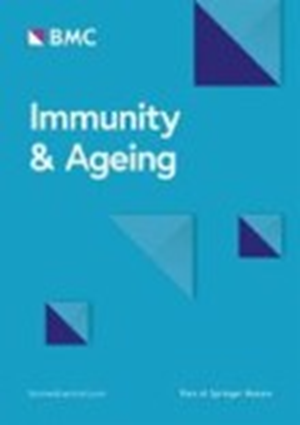Activating A1 adenosine receptor signaling boosts early pulmonary neutrophil recruitment in aged mice in response to Streptococcus pneumoniae infection
IF 5.6
2区 医学
Q1 GERIATRICS & GERONTOLOGY
引用次数: 0
Abstract
Streptococcus pneumoniae (pneumococcus) is a leading cause of pneumonia in older adults. Successful control of pneumococci requires robust pulmonary neutrophil influx early in infection. However, aging is associated with aberrant neutrophil recruitment and the mechanisms behind that are not understood. Here we explored how neutrophil recruitment following pneumococcal infection changes with age and the host pathways regulating this. Following pneumococcal infection there was a significant delay in early neutrophil recruitment to the lungs of aged mice. Neutrophils from aged mice showed defects in trans-endothelial migration in vitro compared to young controls. To understand the pathways involved, we examined immune modulatory extracellular adenosine (EAD) signaling, that is activated upon cellular damage. Signaling through the lower affinity A2A and A2B adenosine receptors had no effect on neutrophil recruitment to infected lungs. In contrast, inhibition of the high affinity A1 receptor in young mice blunted neutrophil recruitment to the lungs following infection. A1 receptor inhibition decreased expression of CXCR2 on circulating neutrophils, which is required for trans-endothelial migration. Indeed, A1 receptor signaling on neutrophils was required for their ability to migrate across endothelial cells in response to infection. Aging was not associated with defects in EAD production or receptor expression on neutrophils. However, agonism of A1 receptor in aged mice rescued the early defect in neutrophil migration to the lungs and improved control of bacterial burden. This study suggests age-driven defects in EAD damage signaling can be targeted to rescue the delay in pulmonary neutrophil migration in response to bacterial pneumonia.激活 A1 腺苷受体信号可促进老龄小鼠在肺炎链球菌感染时早期肺中性粒细胞的募集
肺炎链球菌(肺炎球菌)是导致老年人肺炎的主要原因。要成功控制肺炎球菌,就必须在感染早期让肺部中性粒细胞大量涌入。然而,衰老与中性粒细胞异常招募有关,其背后的机制尚不清楚。在这里,我们探讨了肺炎球菌感染后中性粒细胞的招募是如何随着年龄的增长而发生变化的,以及调节这一变化的宿主途径。肺炎球菌感染后,老年小鼠肺部的早期中性粒细胞募集明显延迟。与年轻对照组相比,老年小鼠的中性粒细胞在体外跨内皮迁移方面表现出缺陷。为了了解其中涉及的途径,我们研究了细胞外腺苷(EAD)信号的免疫调节作用。通过低亲和力 A2A 和 A2B 腺苷受体发出的信号对中性粒细胞招募到受感染肺部没有影响。相反,在幼鼠体内抑制高亲和力的 A1 受体则会阻碍中性粒细胞在感染后被招募到肺部。A1受体抑制降低了循环中性粒细胞上CXCR2的表达,而CXCR2是跨内皮迁移所必需的。事实上,嗜中性粒细胞上的A1受体信号传导是嗜中性粒细胞在感染时跨内皮细胞迁移的必要条件。衰老与中性粒细胞上 EAD 的产生或受体表达的缺陷无关。然而,激动老龄小鼠的 A1 受体可挽救中性粒细胞向肺部迁移的早期缺陷,并改善对细菌负荷的控制。这项研究表明,可以针对年龄驱动的EAD损伤信号传导缺陷来挽救中性粒细胞在应对细菌性肺炎时向肺部迁移的延迟。
本文章由计算机程序翻译,如有差异,请以英文原文为准。
求助全文
约1分钟内获得全文
求助全文
来源期刊

Immunity & Ageing
GERIATRICS & GERONTOLOGY-IMMUNOLOGY
CiteScore
10.20
自引率
3.80%
发文量
55
期刊介绍:
Immunity & Ageing is a specialist open access journal that was first published in 2004. The journal focuses on the impact of ageing on immune systems, the influence of aged immune systems on organismal well-being and longevity, age-associated diseases with immune etiology, and potential immune interventions to increase health span. All articles published in Immunity & Ageing are indexed in the following databases: Biological Abstracts, BIOSIS, CAS, Citebase, DOAJ, Embase, Google Scholar, Journal Citation Reports/Science Edition, OAIster, PubMed, PubMed Central, Science Citation Index Expanded, SCImago, Scopus, SOCOLAR, and Zetoc.
 求助内容:
求助内容: 应助结果提醒方式:
应助结果提醒方式:


